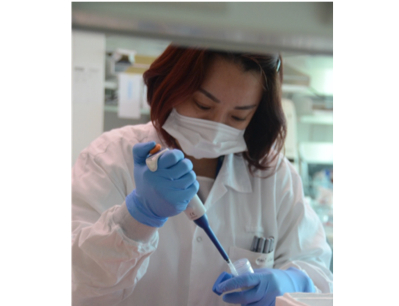Singapore to develop rapid non-invasive tests for COVID-19
20 May 2020 | News
SMART researchers receive NMRC grant to develop Rapid Non-Invasive Paper-Based Serological and Diagnostic tests by using engineered binder proteins

SMART AMR IRG researcher optimising prototype assay
Singapore-MIT Alliance for Research and Technology (SMART), MIT’s research enterprise in Singapore, has received a grant from the National Medical Research Council (NMRC) COVID-19 Research fund for the acceleration of research and development of rapid paper-based serological and diagnostic tests for COVID-19. The 1-year grant is part of NMRC’s support for COVID-19 related research and will focus on developing rapid tests based on protein detection that will overcome challenges and bottlenecks faced by existing diagnostic tests.
An important approach in the multi-pronged strategy to fight the pandemic is the ability to rapidly detect and treat infected individuals to prevent exponential spreading. Presymptomatic and asymptomatic transmissions present difficult challenges in containing the virus.
Even as dozens of diagnostic tests, based on RNA or antibody detection, for COVID-19 have been made available, major challenges remain. Current diagnostic tests require health workers with substantial PPE to collect swabs. Afterwards, skilled personnel and speciality laboratory facilities are needed to prepare samples, run assays, and detect assay signals. This restricts diagnostic capabilities to hospitals and specialised diagnostic laboratories. In addition, assay times for existing genomic profile and serological tests can take as long as 3 hours to 5 days. False negatives are also often observed in genomic profile tests due to low viral loads from throat swab samples.
“Testing of the SARS-CoV-2 virus is important to complement efforts in the fight against the COVID-19 pandemic. We are developing protein tests that may overcome existing challenges faced in Singapore and countries worldwide. These tests could be used by anyone, anywhere, with an almost immediate turnaround time for results. Think rapid influenza test kits but for COVID-19, the paper-based tests will change from white to blue when molecules of the SARS-CoV-2 virus are detected from bodily fluids such as the saliva,” says Professor Peter Preiser, Associate Vice-President for Biomedical and Life Sciences at NTU, and Co-Lead Principal Investigator at SMART AMR.
Researchers from SMART’s Antimicrobial Resistance (AMR) Interdisciplinary Research Group (IRG), Nanyang Technological University (NTU), and Massachusetts Institute of Technology (MIT) are working collaboratively to develop a rapid serological test and a rapid diagnostic test (RDT), based on protein detection, that could be used outside of laboratories, without specialised equipment or infrastructure, at places such as airports and community clinics. Tests can be easily administered by anyone and will be stable in field conditions with results expected within 10 minutes. When SARS-CoV-2 virus is detected on the paper-based tests, the strips will change from white to blue to indicate positive for COVID-19.
Serological Test. The paper-based serological test, using S protein, will detect SARS-CoV-2 antibodies from blood or serum samples. S protein, which is much smaller than an antibody, allows for high-density capture of antigens. Cellulose offers fast flow rates and low non-specific binding, yielding greater sensitivity and faster testing at a lower cost than standard polystyrene 96 well plate serological tests. With the ability to detect past and active infections, the test will help determine the realistic number of SARS-CoV-2 infected cases to understand the true magnitude of the pandemic.
Biomarker Test. The paper-based RDT, using S and N protein, will detect SARS-CoV-2 biomarkers from swabs or bodily fluids such as saliva or blood. The ability to test for N protein, which is observed from as early as day 1 of disease onset, means that the RDT may be able to perform first-line screening for the virus, even for mild infections - an important feature that can help speed up containment efforts.
“Based on past research on the SARS-CoV virus, we have chosen the Spike (S) protein and Nucleocapsid (N) protein as targets, with the latter observed in serum samples from as early as day 1 of disease onset. Using our RDT, we will further determine whether presymptomatic and asymptomatic cases of infections can be detected,” shares Professor Hadley Sikes, Principal Investigator at SMART AMR, and Associate Professor at MIT.
The new rapid tests build upon existing research on diagnostic assays from SMART AMR and the Hadley D. Sikes lab at MIT.
The next phase of the research will focus on the optimisation of fusion proteins that enable high-performance paper-based immunoassays, the directed evolution of binding proteins, and the evaluation of both serology and viral protein tests using clinical samples. Broader usage and implementation of both tests are also being explored.
The research team is led by Professor Peter Preiser, Principal Investigator, Dr Patthara Kongsuphol, Co-Investigator, and Professor Hadley Sikes, Collaborator. It is funded by National Research Foundation (NRF) Singapore, under its Campus for Research Excellence and Technological Enterprise (CREATE) programme, and NMRC, under its COVID-19 Research Fund.












